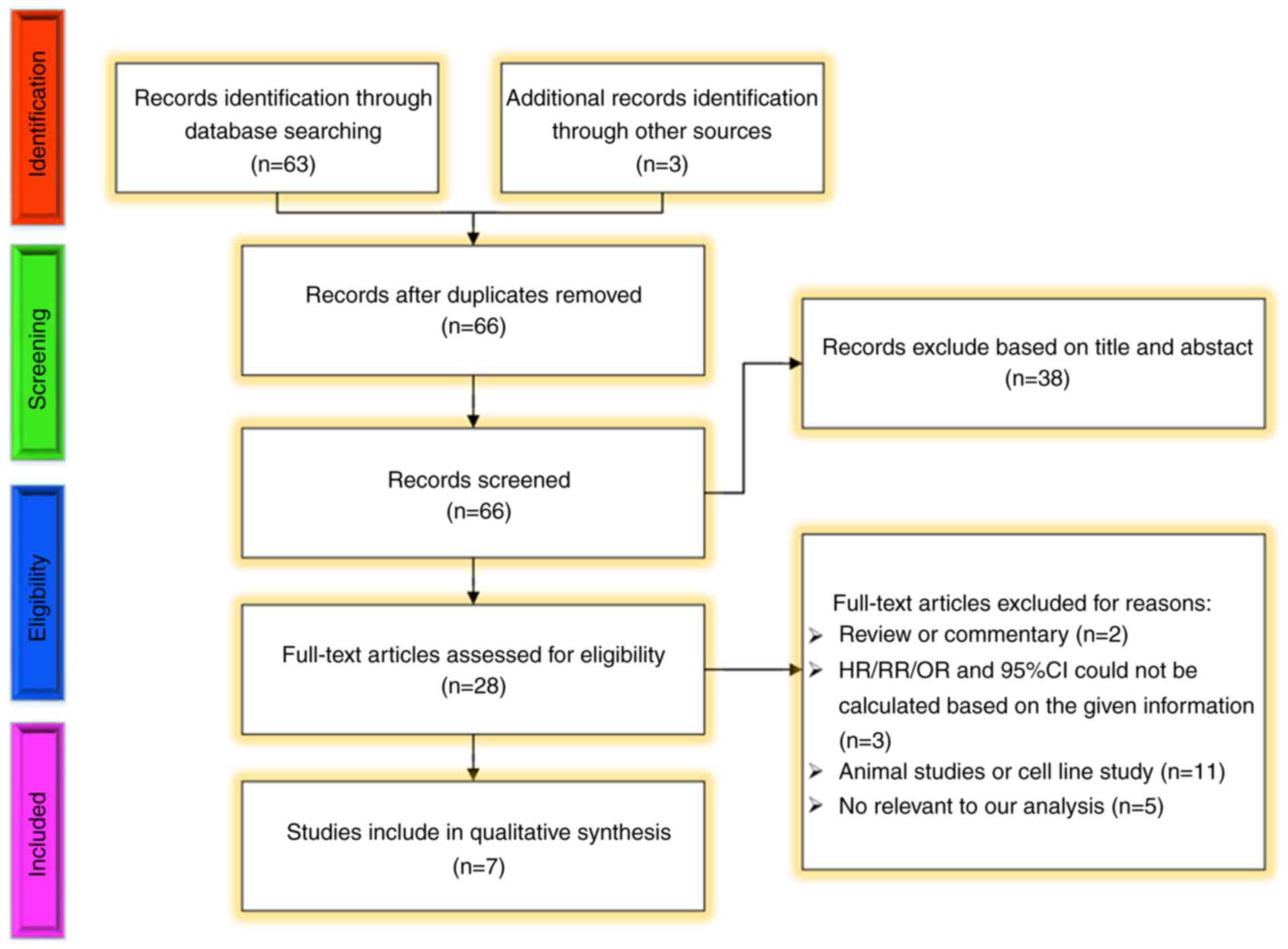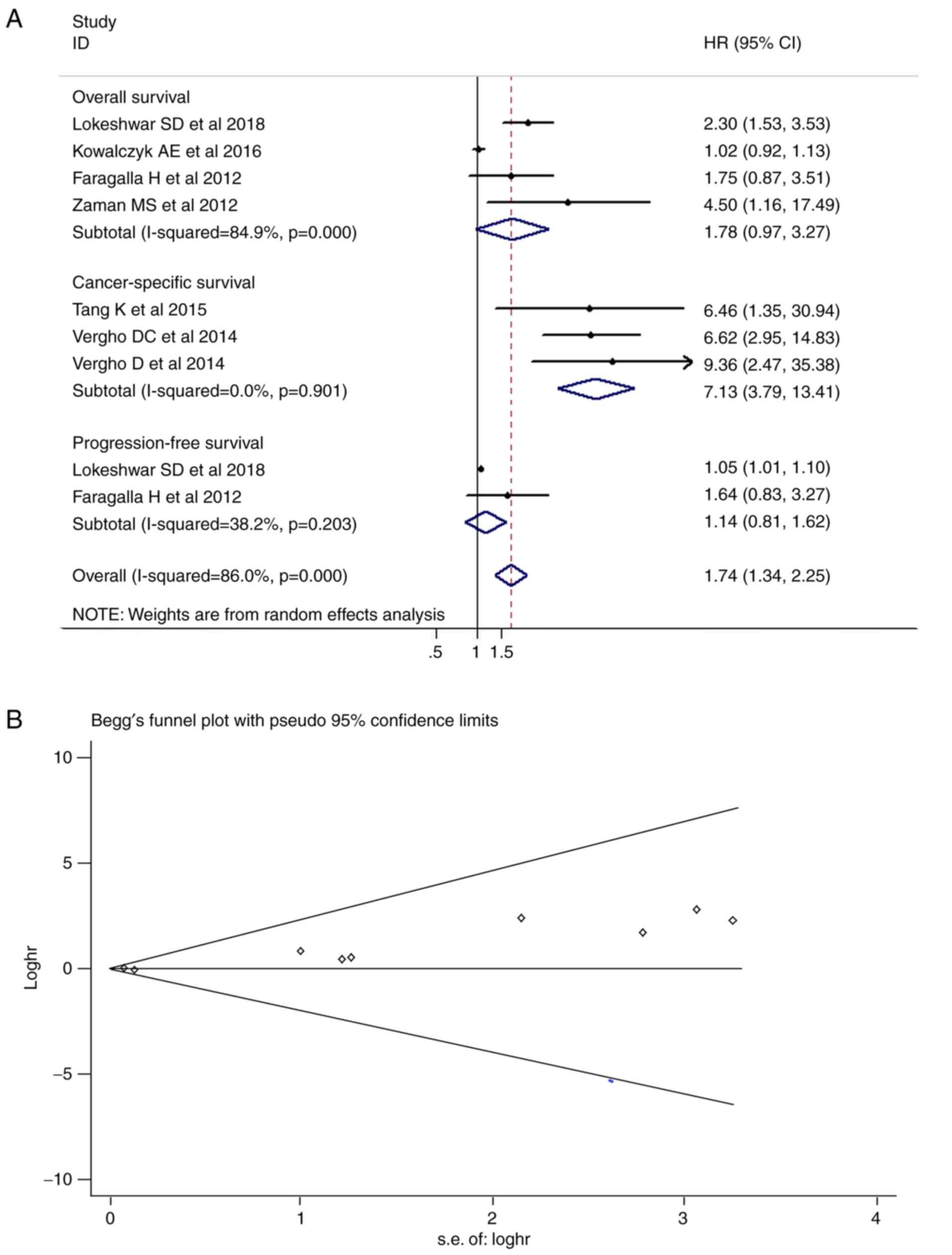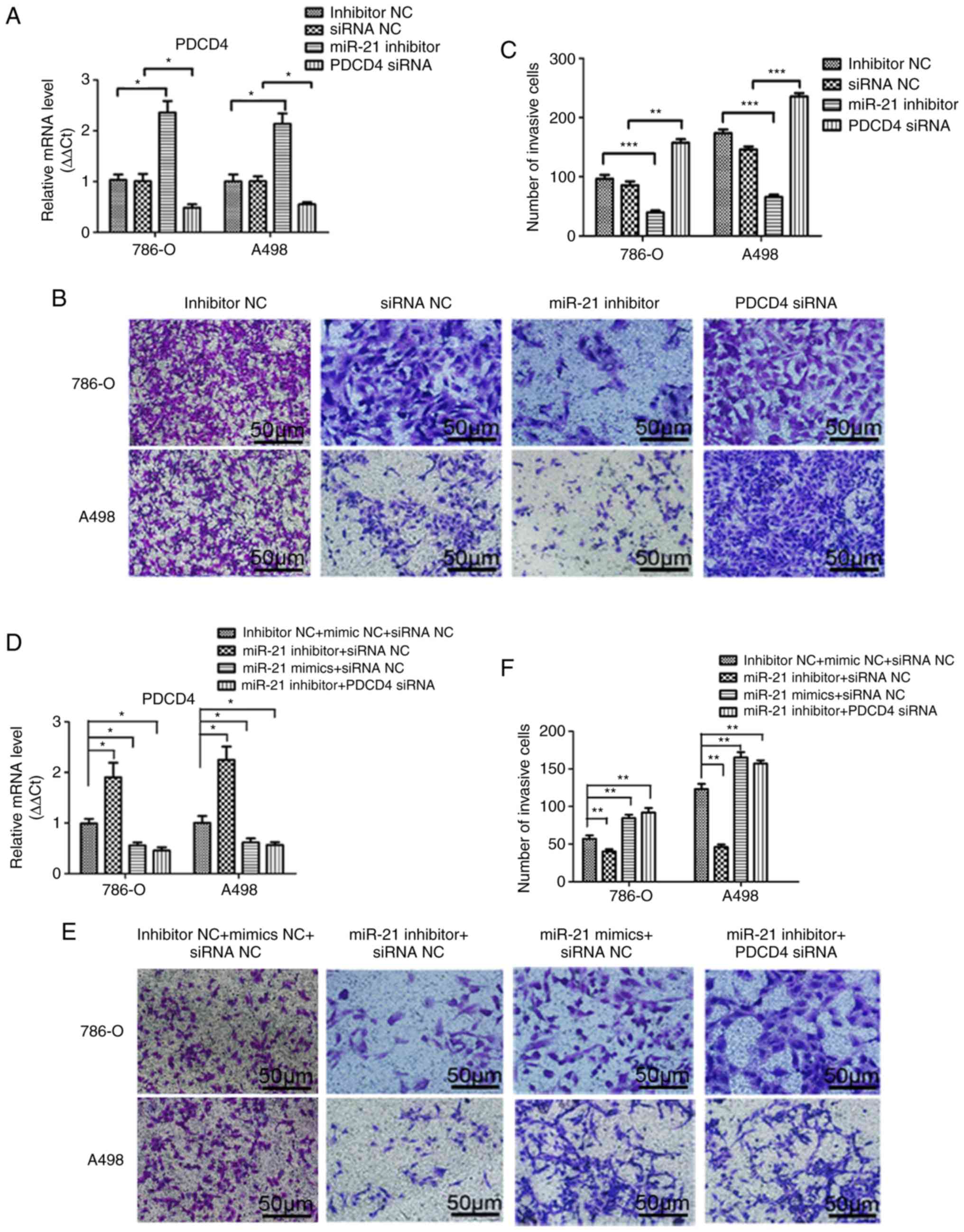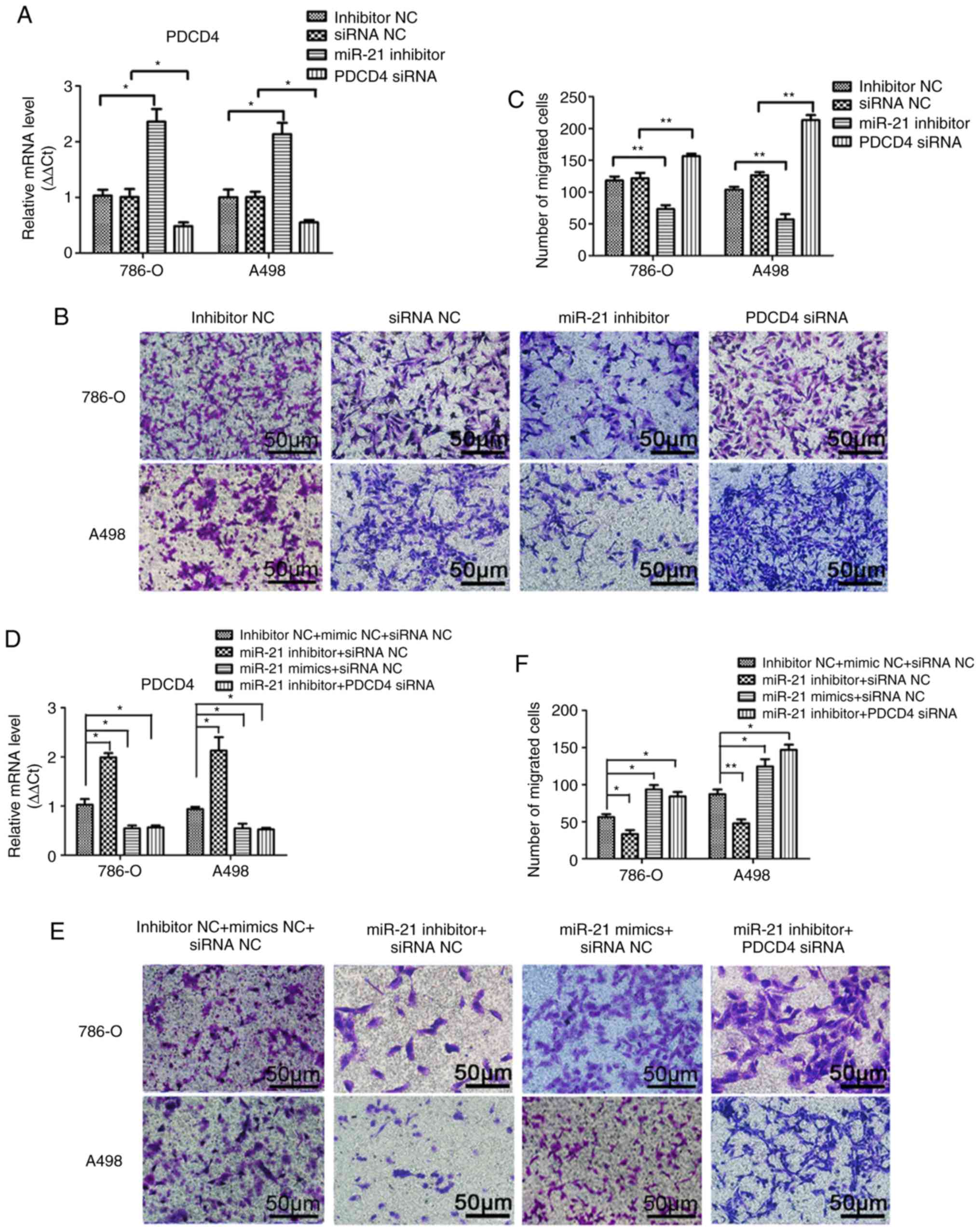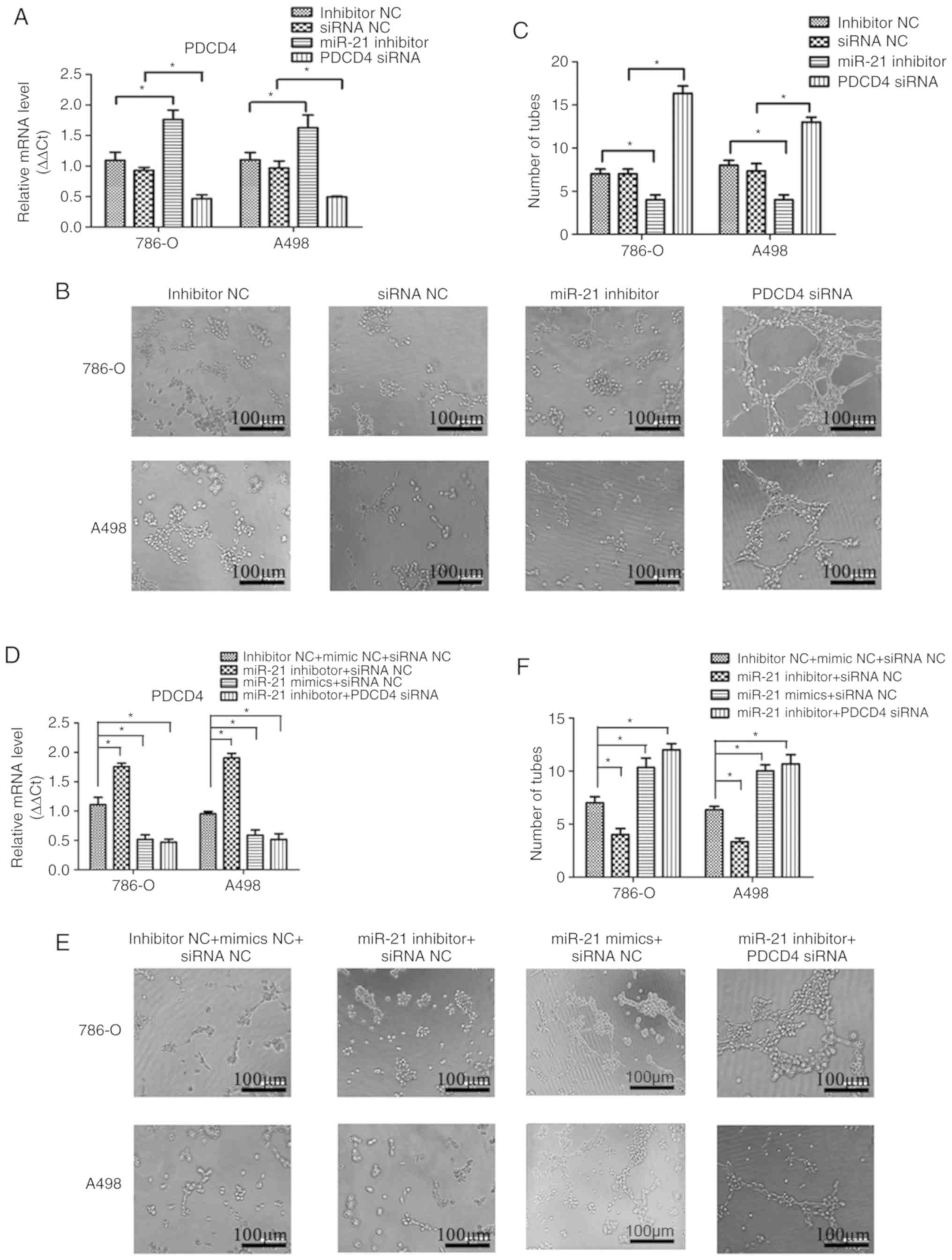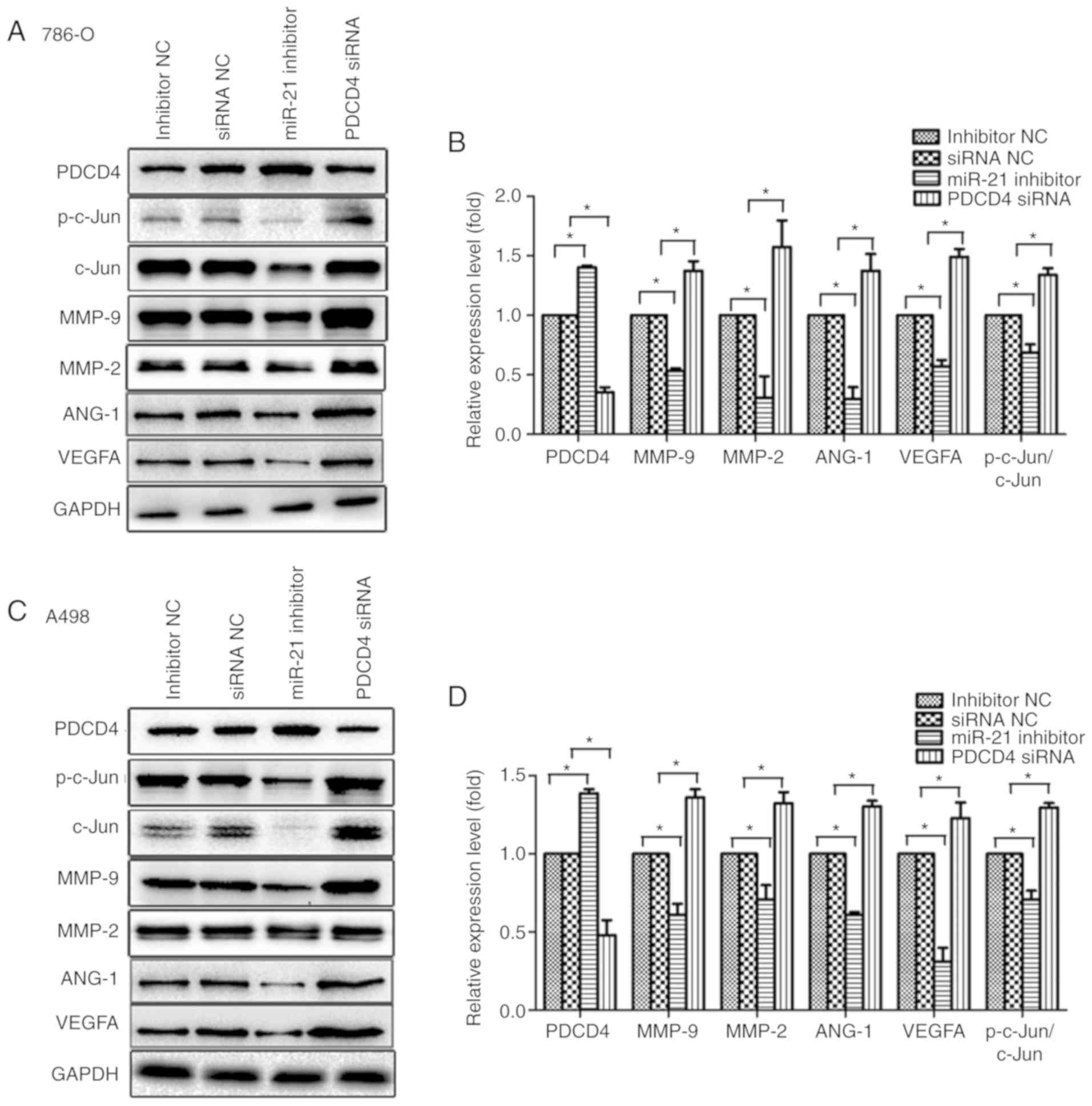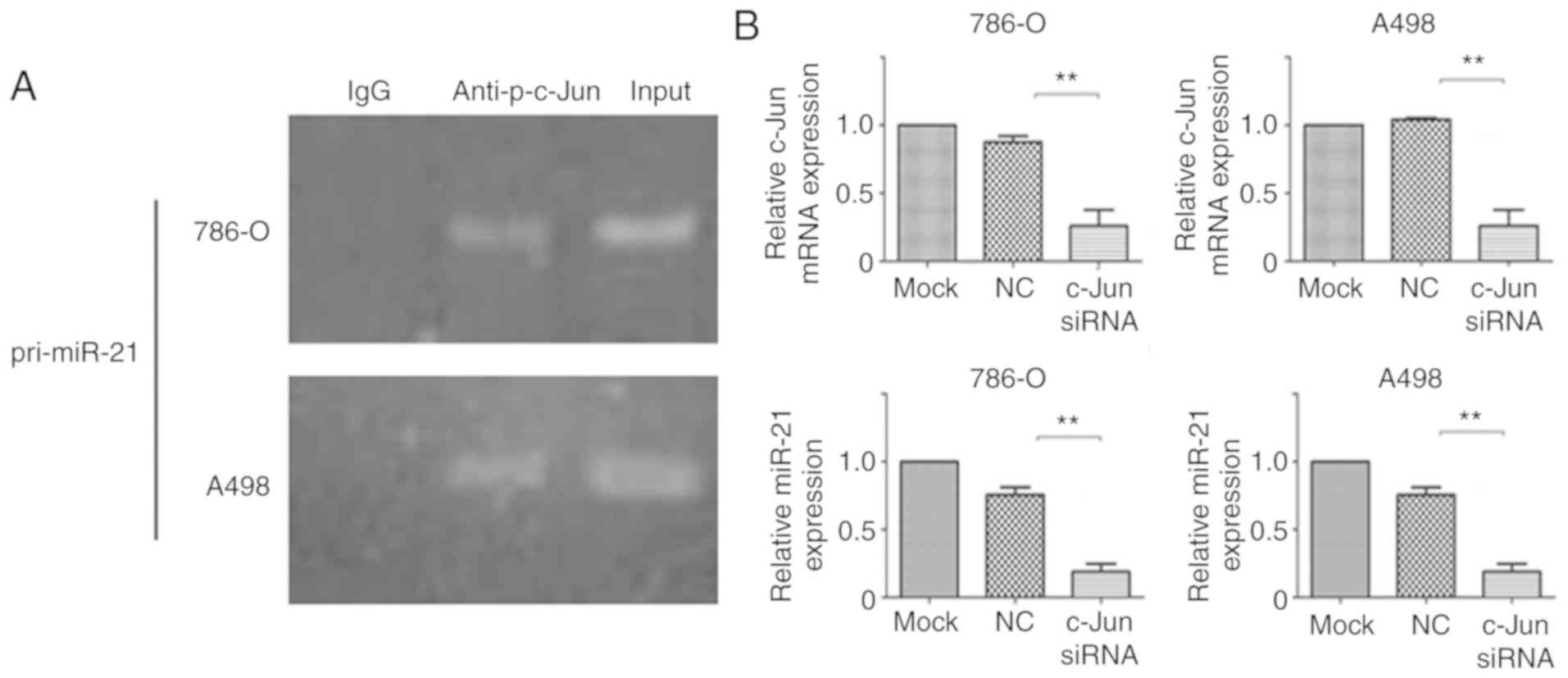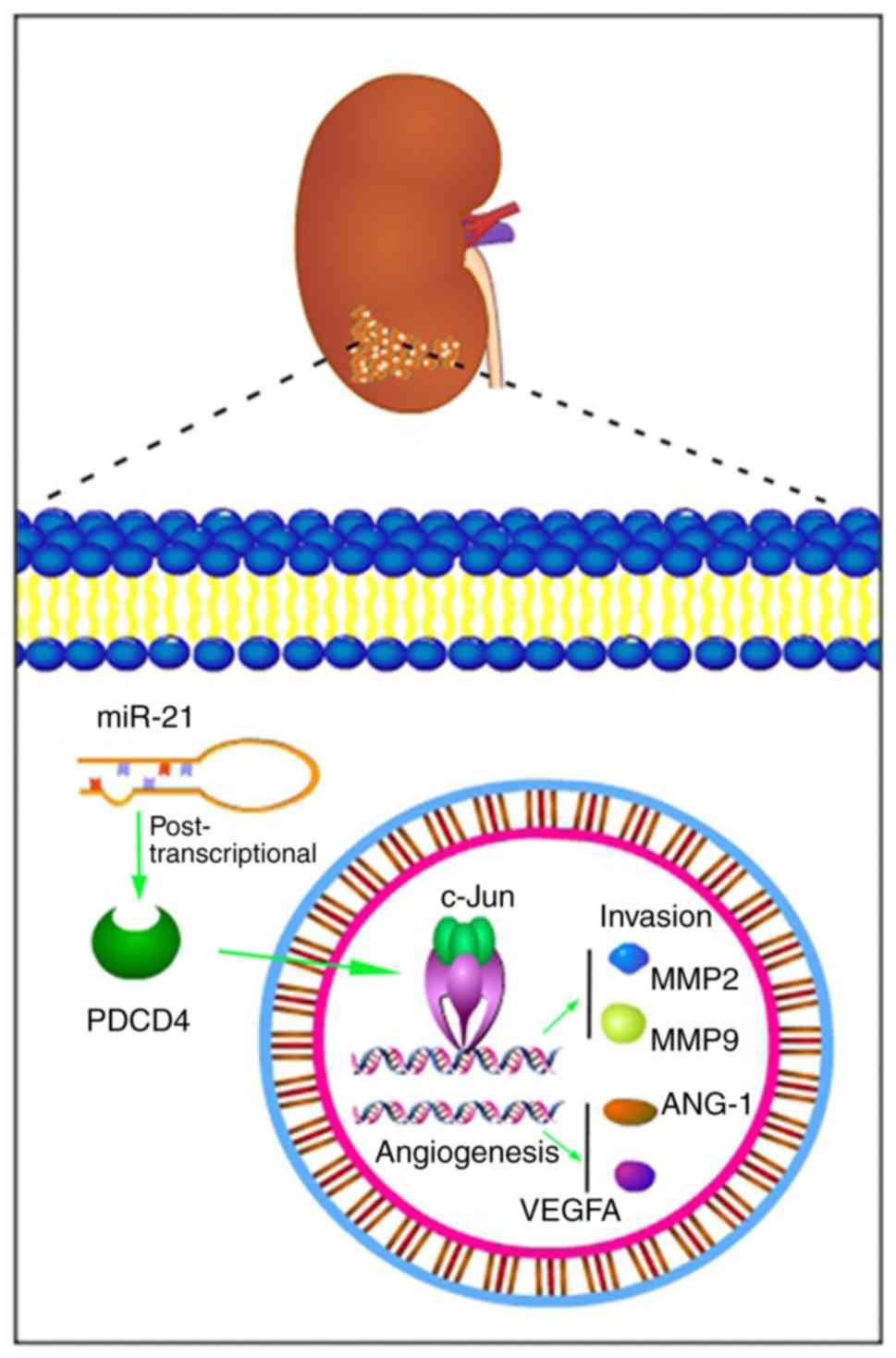|
1
|
Bhatt JR and Finelli A: Landmarks in the
diagnosis and treatment of renal cell carcinoma. Nat Rev Urol.
11:517–525. 2014. View Article : Google Scholar : PubMed/NCBI
|
|
2
|
Siegel RL, Miller KD and Jemal A: Cancer
statistics, 2018. CA Cancer J Clin. 68:7–30. 2018. View Article : Google Scholar : PubMed/NCBI
|
|
3
|
Stahl M, Wilke H, Schmoll HJ, Schöber C,
Diedrich H, Casper J, Freund M and Poliwoda H: A phase II study of
high dose tamoxifen in progressive, metastatic renal cell
carcinoma. Ann Oncol. 3:167–168. 1992. View Article : Google Scholar : PubMed/NCBI
|
|
4
|
Choueiri TK and Motzer RJ: Systemic
therapy for metastatic renal cell carcinoma. N Engl J Med.
376:354–366. 2017. View Article : Google Scholar : PubMed/NCBI
|
|
5
|
Dabestani S, Marconi L, Hofmann F, Stewart
F, Lam TB, Canfield SE, Staehler M, Powles T, Ljungberg B and Bex
A: Local treatments for metastases of renal cell carcinoma: A
systematic review. Lancet Oncol. 15:e549-e5612014. View Article : Google Scholar
|
|
6
|
Qu L, Wang ZL, Chen Q, Li YM, He HW, Hsieh
JJ, Xue S, Wu ZJ, Liu B, Tang H, et al: Prognostic value of a long
non-coding RNA signature in localized clear cell renal cell
carcinoma. Eur Urol. 74:756–763. 2018. View Article : Google Scholar : PubMed/NCBI
|
|
7
|
Sekar RR, Patil D, Baum Y, Pearl J, Bausum
A, Bilen MA, Kucuk O, Harris WB, Carthon BC, Alemozaffar M, et al:
A novel preoperative inflammatory marker prognostic score in
patients with localized and metastatic renal cell carcinoma. Asian
J Urol. 4:230–238. 2017. View Article : Google Scholar
|
|
8
|
Escudier B, Motzer RJ, Sharma P, Wagstaff
J, Plimack ER, Hammers HJ, Donskov F, Gurney H, Sosman JA, Zalewski
PG, et al: Treatment beyond progression in patients with advanced
renal cell carcinoma treated with nivolumab in checkmate 025. Eur
Urol. 72:368–376. 2017. View Article : Google Scholar : PubMed/NCBI
|
|
9
|
Kroeger N, Stenzl A, Burchardt M and Bedke
J: Adjuvant treatment of high-risk renal cell carcinoma: Leaving
the det. Eur Urol. 71:695–696. 2017. View Article : Google Scholar : PubMed/NCBI
|
|
10
|
Leibovich BC, Lohse CM, Cheville JC, Zaid
HB, Boorjian SA, Frank I, Thompson RH and Parker WP: Predicting
oncologic outcomes in renal cell carcinoma after surgery. Eur Urol.
73:772–780. 2018. View Article : Google Scholar : PubMed/NCBI
|
|
11
|
Verbiest A, Couchy G, Job S, Caruana L,
Lerut E, Oyen R, de Reyniès A, Tosco L, Joniau S, Van Poppel H, et
al: Molecular subtypes of clear-cell renal cell carcinoma are
prognostic for outcome after complete metastasectomy. Eur Urol.
74:474–480. 2018. View Article : Google Scholar : PubMed/NCBI
|
|
12
|
Hydbring P, Wang Y, Fassl A, Li X, Matia
V, Otto T, Choi YJ, Sweeney KE, Suski JM, Yin H, et al:
Cell-cycle-targeting MicroRNAs as therapeutic tools against
refractory cancers. Cancer Cell. 31:576–590.e8. 2017. View Article : Google Scholar : PubMed/NCBI
|
|
13
|
Yang HY, Barbi J, Wu CY, Zheng Y, Vignali
PD, Wu X, Tao JH, Park BV, Bandara S, Novack L, et al: MicroRNA-17
modulates regulatory T cell function by targeting Co-regulators of
the Foxp3 transcription factor. Immunity. 45:83–93. 2016.
View Article : Google Scholar : PubMed/NCBI
|
|
14
|
Lin XJ, Chong Y, Guo ZW, Xie C, Yang XJ,
Zhang Q, Li SP, Xiong Y, Yuan Y, Min J, et al: A serum microRNA
classifier for early detection of hepatocellular carcinoma: A
multicentre, retrospective, longitudinal biomarker identification
study with a nested case-control study. Lancet Oncol. 16:804–815.
2015. View Article : Google Scholar : PubMed/NCBI
|
|
15
|
Iqbal MA, Arora S, Prakasam G, Calin GA
and Syed MA: MicroRNA in lung cancer: Role, mechanisms, pathways
and therapeutic relevance. Mol Aspects Med. August 18–2018.Epub
ahead of print. PubMed/NCBI
|
|
16
|
Croset M, Pantano F, Kan CWS, Bonnelye E,
Descotes F, Alix-Panabières C, Lecellier CH, Bachelier R, Allioli
N, Hong SS, et al: miRNA-30 family members inhibit breast cancer
invasion, osteomimicry, and bone destruction by directly targeting
multiple bone metastasis-associated genes. Cancer Res.
78:5259–5273. 2018. View Article : Google Scholar : PubMed/NCBI
|
|
17
|
Song S, Yang Y, Liu M, Liu B, Yang X, Yu
M, Qi H, Ren M, Wang Z, Zou J, et al: miR-125b attenuates human
hepatocellular carcinoma malignancy through targeting SIRT6. Am J
Cancer Res. 8:993–1007. 2018.PubMed/NCBI
|
|
18
|
Li Q, Zhang S, Wang M, Dong S, Wang Y, Liu
S, Lu T, Fu Y, Wang X and Chen G: Downregulated miR-21 mediates
matrine-induced apoptosis via the PTEN/Akt signaling pathway in FTC
133 human follicular thyroid cancer cells. Oncol Lett.
18:3553–3560. 2019.PubMed/NCBI
|
|
19
|
Dino P, D'Anna C, Sangiorgi C, Di Sano C,
Di Vincenzo S, Ferraro M and Pace E: Cigarette smoke extract
modulates E-Cadherin, Claudin-1 and miR-21 and promotes cancer
invasiveness in human colorectal adenocarcinoma cells. Toxicol
Lett. 317:102–109. 2019. View Article : Google Scholar : PubMed/NCBI
|
|
20
|
Sun J, Jiang Z, Li Y, Wang K, Chen X and
Liu G: Downregulation of miR-21 inhibits the malignant phenotype of
pancreatic cancer cells by targeting VHL. Onco Targets Ther.
12:7215–7226. 2019. View Article : Google Scholar : PubMed/NCBI
|
|
21
|
Li X, Xin S, He Z, Che X, Wang J, Xiao X,
Chen J and Song X: microRNA-21 (miR-21) post-transcriptionally
downregulates tumor suppressor PDCD4 and promotes cell
transformation, proliferation, and metastasis in renal cell
carcinoma. Cell Physiol Biochem. 33:1631–1642. 2014. View Article : Google Scholar : PubMed/NCBI
|
|
22
|
Lokeshwar SD, Talukder A, Yates TJ, Hennig
MJP, Garcia Roig M, Lahorewala SS, Mullani NN, Klaassen Z, Kava BR,
Manoharan M, et al: Molecular characterization of renal cell
carcinoma: A potential three MicroRNA prognostic signature. Cancer
Epidemiol Biomarkers Prev. 27:464–472. 2018. View Article : Google Scholar : PubMed/NCBI
|
|
23
|
Kowalczyk AE, Krazinski BE, Godlewski J,
Grzegrzolka J, Kiewisz J, Kwiatkowski P, Sliwinska-Jewsiewicka A,
Dziegiel P and Kmiec Z: SATB1 is down-regulated in clear cell renal
cell carcinoma and correlates with miR-21-5p overexpression and
poor prognosis. Cancer Genomics Proteomics. 13:209–217.
2016.PubMed/NCBI
|
|
24
|
Tang K and Xu H: Prognostic value of
meta-signature miRNAs in renal cell carcinoma: An integrated miRNA
expression profiling analysis. Sci Rep. 5:102722015. View Article : Google Scholar : PubMed/NCBI
|
|
25
|
Vergho D, Kneitz S, Rosenwald A, Scherer
C, Spahn M, Burger M, Riedmiller H and Kneitz B: Combination of
expression levels of miR-21 and miR-126 is associated with
cancer-specific survival in clear cell renal cell carcinoma. BMC
Cancer. 14:252014. View Article : Google Scholar
|
|
26
|
Vergho DC, Kneitz S, Kalogirou C, Burger
M, Krebs M, Rosenwald A, Spahn M, Löser A, Kocot A, Riedmiller H
and Kneitz B: Impact of miR-21, miR-126 and miR-221 as prognostic
factors of clear cell renal cell carcinoma with tumor thrombus of
the inferior vena cava. PLoS One. 9:e1098772014. View Article : Google Scholar : PubMed/NCBI
|
|
27
|
Faragalla H, Youssef YM, Scorilas A,
Khalil B, White NM, Mejia-Guerrero S, Khella H, Jewett MA, Evans A,
Lichner Z, et al: The clinical utility of miR-21 as a diagnostic
and prognostic marker for renal cell carcinoma. J Mol Diagn.
14:385–392. 2012. View Article : Google Scholar : PubMed/NCBI
|
|
28
|
Zaman MS, Shahryari V, Deng G, Thamminana
S, Saini S, Majid S, Chang I, Hirata H, Ueno K, Yamamura S, et al:
Up regulation of microRNA-21 correlates with lower kidney cancer
survival. PLoS One. 7:e310602012. View Article : Google Scholar
|
|
29
|
Tierney JF, Stewart LA, Ghersi D, Burdett
S and Sydes MR: Practical methods for incorporating summary
time-to-event data into meta-analysis. Trials. 8:162007. View Article : Google Scholar : PubMed/NCBI
|
|
30
|
Livak KJ and Schmittgen TD: Analysis of
relative gene expression data using real-time quantitative PCR and
the 2(−Delta Delta C(T)) method. Methods. 25:402–408. 2001.
View Article : Google Scholar
|
|
31
|
Zhou J, Wang KC, Wu W, Subramaniam S, Shyy
JY, Chiu JJ, Li JY and Chien S: microRNA-21 targets peroxisome
proliferators-activated receptor-alpha in an autoregulatory loop to
modulate flow-induced endothelial inflammation. Proc Natl Acad Sci
USA. 108:10355–10360. 2011. View Article : Google Scholar : PubMed/NCBI
|
|
32
|
Echevarría-Vargas IM, Valiyeva F and
Vivas-Mejía PE: Upregulation of miR-21 in cisplatin resistant
ovarian cancer via JNK-1/c-Jun pathway. PLoS One. 9:e970942014.
View Article : Google Scholar : PubMed/NCBI
|
|
33
|
Carlsson J, Christiansen J, Davidsson S,
Giunchi F, Fiorentino M and Sundqvist P: The potential role of miR
126, miR-21 and miR 10b as prognostic biomarkers in renal cell
carcinoma. Oncol Lett. 17:4566–4574. 2019.PubMed/NCBI
|
|
34
|
Chen J, Gu Y and Shen W: microRNA-21
functions as an oncogene and promotes cell proliferation and
invasion via TIMP3 in renal cancer. Eur Rev Med Pharmacol Sci.
21:4566–4576. 2017.PubMed/NCBI
|
|
35
|
Fan B, Zhang H, Jin H, Gai Y, Wang H, Zong
H, Jin M, Yang H, Wan S, Zhu J, et al: Is overexpression of Ki-67 a
prognostic biomarker of upper tract urinary carcinoma? A
retrospective cohort study and meta-analysis. Cell Physiol Biochem.
40:1613–1625. 2016. View Article : Google Scholar : PubMed/NCBI
|
|
36
|
Delfino KR, Serão NV, Southey BR and
Rodriguez-Zas SL: Therapy-, gender- and race-specific microRNA
markers, target genes and networks related to glioblastoma
recurrence and survival. Cancer Genomics Proteomics. 8:173–183.
2011.PubMed/NCBI
|
|
37
|
Czachorowski MJ, Amaral AF, Montes Moreno
S, Lloreta J, Carrato A, Tardón A, Morente MM, Kogevinas M, Real FX
and Malats N; SBC/EPICURO investigators: Cyclooxygenase-2
expression in bladder cancer and patient prognosis: Results from a
large clinical cohort and meta-analysis. PLoS One. 7:e450252012.
View Article : Google Scholar : PubMed/NCBI
|
|
38
|
Ku JH, Byun SS, Jeong H, Kwak C, Kim HH
and Lee SE: The role of p53 on survival of upper urinary tract
urothelial carcinoma: A systematic review and meta-analysis. Clin
Genitourin Cancer. 11:221–228. 2013. View Article : Google Scholar : PubMed/NCBI
|
|
39
|
Kakimoto Y, Tanaka M, Kamiguchi H, Ochiai
E and Osawa M: MicroRNA stability in FFPE tissue samples:
Dependence on GC content. PLoS One. 11:e01631252016. View Article : Google Scholar : PubMed/NCBI
|
|
40
|
Wyman SK, Parkin RK, Mitchell PS, Fritz
BR, O'Briant K, Godwin AK, Urban N, Drescher CW, Knudsen BS and
Tewari M: Repertoire of microRNAs in epithelial ovarian cancer as
determined by next generation sequencing of small RNA cDNA
libraries. PLoS One. 4:e53112009. View Article : Google Scholar : PubMed/NCBI
|
|
41
|
Stratmann J, Wang CJ, Gnosa S, Wallin A,
Hinselwood D, Sun XF and Zhang H: Dicer and miRNA in relation to
clinicopathological variables in colorectal cancer patients. BMC
Cancer. 11:3452011. View Article : Google Scholar : PubMed/NCBI
|
|
42
|
Androvic P, Valihrach L, Elling J, Sjoback
R and Kubista M: Two-tailed RT-qPCR: A novel method for highly
accurate miRNA quantification. Nucleic Acids Res. 45:e1442017.
View Article : Google Scholar : PubMed/NCBI
|
|
43
|
Macfarlane LA and Murphy PR: MicroRNA:
Biogenesis, function and role in cancer. Curr Genomics. 11:537–561.
2010. View Article : Google Scholar
|
|
44
|
Nassar FJ, Nasr R and Talhouk R: MicroRNAs
as biomarkers for early breast cancer diagnosis, prognosis and
therapy prediction. Pharmacol Ther. 172:34–49. 2017. View Article : Google Scholar
|
|
45
|
Negoi I, Hostiuc S, Sartelli M, Negoi RI
and Beuran M: microRNA-21 as a prognostic biomarker in patients
with pancreatic cancer - A systematic review and meta-analysis. Am
J Surg. 214:515–524. 2017. View Article : Google Scholar : PubMed/NCBI
|
|
46
|
Ren J, Kuang TH, Chen J, Yang JW and Liu
YX: The diagnostic and prognostic values of microRNA-21 in patients
with gastric cancer: A meta-analysis. Eur Rev Med Pharmacol Sci.
21:120–130. 2017.PubMed/NCBI
|
|
47
|
Jiang J, Yang P, Guo Z, Yang R, Yang H,
Yang F, Li L and Xiang B: Overexpression of microRNA-21 strengthens
stem cell-like characteristics in a hepatocellular carcinoma cell
line. World J Surg Oncol. 14:2782016. View Article : Google Scholar : PubMed/NCBI
|
|
48
|
Qi R, Wang DT, Xing LF and Wu ZJ: miRNA-21
promotes gastric cancer growth by adjusting prostaglandin E2. Eur
Rev Med Pharmacol Sci. 22:1929–1936. 2018.PubMed/NCBI
|
|
49
|
Su C, Cheng X, Li Y, Han Y, Song X, Yu D,
Cao X and Liu Z: miR-21 improves invasion and migration of drug
resistant lung adenocarcinoma cancer cell and transformation of EMT
through targeting HBP1. Cancer Med. 7:2485–2503. 2018. View Article : Google Scholar : PubMed/NCBI
|
|
50
|
Yu X, Chen Y, Tian R, Li J, Li H, Lv T and
Yao Q: miRNA-21 enhances chemoresistance to cisplatin in epithelial
ovarian cancer by negatively regulating PTEN. Oncol Lett.
14:1807–1810. 2017. View Article : Google Scholar : PubMed/NCBI
|
|
51
|
Peinado H, Alečković M, Lavotshkin S,
Matei I, Costa-Silva B, Moreno Bueno G, Hergueta Redondo M,
Williams C, García-Santos G, Ghajar C, et al: Melanoma exosomes
educate bone marrow progenitor cells toward a pro-metastatic
phenotype through MET. Nat Med. 18:883–891. 2012. View Article : Google Scholar : PubMed/NCBI
|
|
52
|
Samsonov R, Burdakov V, Shtam T,
Radzhabovа Z, Vasilyev D, Tsyrlina E, Titov S, Ivanov M, Berstein
L, Filatov M, et al: Plasma exosomal miR-21 and miR-181a
differentiates follicular from papillary thyroid cancer. Tumour
Biol. 37:12011–12021. 2016. View Article : Google Scholar : PubMed/NCBI
|
|
53
|
Wang JJ, Wang ZY, Chen R, Xiong J, Yao YL,
Wu JH and Li GX: Macrophage-secreted exosomes delivering miRNA-21
inhibitor can regulate BGC-823 cell proliferation. Asian Pac J
Cancer Prev. 16:4203–4209. 2015. View Article : Google Scholar : PubMed/NCBI
|
|
54
|
Besheer T, Elalfy H, Abd El-Maksoud M, Abd
El-Razek A, Taman S, Zalata K, Elkashef W, Zaghloul H, Elshahawy H,
Raafat D, et al: Diffusion weighted magnetic resonance imaging and
micro-RNA in the diagnosis of hepatic fibrosis in chronic hepatitis
C virus. World J Gastroenterol. 25:1366–1377. 2019. View Article : Google Scholar : PubMed/NCBI
|
|
55
|
Panagal M, S R SK, P S, M B, M K,
Gopinathe V, Sivakumare P and Sekar D: MicroRNA21 and the various
types of myeloid leukemia. Cancer Gene Ther. 25:161–166. 2018.
View Article : Google Scholar : PubMed/NCBI
|
|
56
|
Chen C, Lu C, Qian Y, Li H, Tan Y, Cai L
and Weng H: Urinary miR-21 as a potential biomarker of hypertensive
kidney injury and fibrosis. Sci Rep. 7:177372017. View Article : Google Scholar : PubMed/NCBI
|
|
57
|
Xiong G, Huang Z, Jiang H, Pan Z, Xie J
and Wang S: Inhibition of microRNA-21 decreases the invasiveness of
fibroblast-like synoviocytes in rheumatoid arthritis via TGFβ/Smads
signaling pathway. Iran J Basic Med Sci. 19:787–793.
2016.PubMed/NCBI
|
|
58
|
Zheng Y, Xie J, Jiang F, Li Y, Chang G and
Ma H: Inhibition of miR-21 promotes cell apoptosis in oral squamous
cell carcinoma by upregulating PTEN. Oncol Rep. 40:2798–2805.
2018.PubMed/NCBI
|
|
59
|
Yan F, Wang C, Li T, Cai W and Sun J: Role
of miR-21 in the growth and metastasis of human salivary adenoid
cystic carcinoma. Mol Med Rep. 17:4237–4244. 2018.PubMed/NCBI
|
|
60
|
Bera A, Das F, Ghosh-Choudhury N, Kasinath
BS, Abboud HE and Choudhury GG: microRNA-21 induced dissociation of
PDCD4 from rictor contributes to Akt-IKKβ-mTORC1 axis to regulate
renal cancer cell invasion. Exp Cell Res. 328:99–117. 2014.
View Article : Google Scholar : PubMed/NCBI
|
|
61
|
Luo G, Luo W, Sun X, Lin J, Wang M and
Zhang Y, Luo W and Zhang Y: microRNA-21 promotes migration and
invasion of glioma cells via activation of Sox2 and β-catenin
signaling. Mol Med Rep. 15:187–193. 2017. View Article : Google Scholar
|
|
62
|
Zhang N, Duan WD, Leng JJ, Zhou L, Wang X,
Xu YZ, Wang XD, Zhang AQ and Dong JH: STAT3 regulates the migration
and invasion of a stem-like subpopulation through microRNA-21 and
multiple targets in hepatocellular carcinoma. Oncol Rep.
33:1493–1498. 2015. View Article : Google Scholar : PubMed/NCBI
|
|
63
|
Au Yeung CL, Co NN, Tsuruga T, Yeung TL,
Kwan SY, Leung CS, Li Y, Lu ES, Kwan K, Wong KK, et al: Exosomal
transfer of stroma-derived miR21 confers paclitaxel resistance in
ovarian cancer cells through targeting APAF1. Nat Commun.
7:111502016. View Article : Google Scholar : PubMed/NCBI
|
|
64
|
Wang L, Jia Q, Xinnong C, Xie Y, Yang Y,
Zhang A, Liu R, Zhuo Y and Zhang J: Role of cardiac progenitor
cell-derived exosome-mediated microRNA-210 in cardiovascular
disease. J Cell Mol Med. 23:7124–7131. 2019. View Article : Google Scholar : PubMed/NCBI
|
|
65
|
Xie W, Su W, Xia H, Wang Z, Su C and Su B:
Synovial Fluid microRNA-210 as a potential biomarker for early
prediction of osteoarthritis. Biomed Res Int. 2019:71654062019.
View Article : Google Scholar : PubMed/NCBI
|
|
66
|
Zhuang Y, Peng H, Mastej V and Chen W:
MicroRNA regulation of endothelial junction proteins and clinical
consequence. Mediators Inflamm. 2016:50786272016. View Article : Google Scholar : PubMed/NCBI
|
|
67
|
Merrigan SL and Kennedy BN: Vitamin D
receptor agonists regulate ocular developmental angiogenesis and
modulate expression of dre-miR-21 and VEGF. Br J Pharmacol.
174:2636–2651. 2017. View Article : Google Scholar : PubMed/NCBI
|
|
68
|
Zheng Z, Xu PP, Wang L, Zhao HJ, Weng XQ,
Zhong HJ, Qu B, Xiong J, Zhao Y, Wang XF, et al: MiR21 sensitized
B-lymphoma cells to ABT-199 via ICOS/ICOSL-mediated interaction of
Treg cells with endothelial cells. J Exp Clin Cancer Res.
36:822017. View Article : Google Scholar : PubMed/NCBI
|
|
69
|
He XP, Chen P, Yang K, Liu B, Zhang Y,
Wang F, Guo Z, Liu XD, Lou JX and Chen HR: Overexpression of miR-21
is involved in acute monocytic leukemia-associated angiogenesis by
targeting IL-12. Mol Med Rep. 18:4122–4128. 2018.PubMed/NCBI
|
|
70
|
Song MS and Rossi JJ: The anti-miR21
antagomir, a therapeutic tool for colorectal cancer, has a
potential synergistic effect by perturbing an angiogenesis
associated miR30. Front Genet. 4:3012014. View Article : Google Scholar
|
|
71
|
Yuan H, Xin S, Huang Y, Bao Y, Jiang H,
Zhou L, Ren X, Li L, Wang Q and Zhang J: Downregulation of PDCD4 by
miR-21 suppresses tumor transformation and proliferation in a nude
mouse renal cancer model. Oncol Lett. 14:3371–3378. 2017.
View Article : Google Scholar : PubMed/NCBI
|
|
72
|
Suman P, Godbole G, Thakur R,
Morales-Prieto DM, Modi DN, Markert UR and Gupta SK: AP-1
transcription factors, mucin-type molecules and MMPs regulate the
IL-11 mediated invasiveness of JEG 3 and HTR 8/SVneo trophoblastic
cells. PLoS One. 7:e297452012. View Article : Google Scholar
|
|
73
|
Hwang YP, Yun HJ, Choi JH, Han EH, Kim HG,
Song GY, Kwon KI, Jeong TC and Jeong HG: Suppression of EGF-induced
tumor cell migration and matrix metalloproteinase-9 expression by
capsaicin via the inhibition of EGFR-mediated FAK/Akt, PKC/Raf/ERK,
p38 MAPK, and AP-1 signaling. Mol Nutr Food Res. 55:594–605. 2011.
View Article : Google Scholar : PubMed/NCBI
|
|
74
|
Chen Q, Chen P, Pang X, Hu Y and Zhang Y:
Adrenomedullin up regulates the expression of vascular endothelial
growth factor in epithelial ovarian carcinoma cells via JNK/AP-1
pathway. Int J Gynecol Cancer. 25:953–960. 2015. View Article : Google Scholar : PubMed/NCBI
|
|
75
|
Cossutta M, Darche M, Carpentier G, Houppe
C, Ponzo M, Raineri F, Vallée B, Gilles ME, Villain D, Picard E, et
al: Weibel-palade bodies orchestrate pericytes during angiogenesis.
Arterioscler Thromb Vasc Biol. 39:1843–1858. 2019. View Article : Google Scholar : PubMed/NCBI
|
|
76
|
Pellegrinelli V, Rouault C, Veyrie N,
Clément K and Lacasa D: Endothelial cells from visceral adipose
tissue disrupt adipocyte functions in a three-dimensional setting:
Partial rescue by angiopoietin-1. Diabetes. 63:535–549. 2014.
View Article : Google Scholar
|
|
77
|
Brudno Y, Ennett Shepard AB, Chen RR,
Aizenberg M and Mooney DJ: Enhancing microvascular formation and
vessel maturation through temporal control over multiple
pro-angiogenic and pro maturation factors. Biomaterials.
34:9201–9209. 2013. View Article : Google Scholar : PubMed/NCBI
|
|
78
|
Khan JA, Maki RG and Ravi V: Pathologic
angiogenesis of malignant vascular sarcomas: Implications for
treatment. J Clin Oncol. 36:194–201. 2018. View Article : Google Scholar
|
|
79
|
Liu Z, Ivanoff A and Klominek J:
Expression and activity of matrix metalloproteases in human
malignant mesothelioma cell lines. Int J Cancer. 91:638–643. 2001.
View Article : Google Scholar : PubMed/NCBI
|
|
80
|
Hirano H, Tsuji M, Kizaki T, Sashikata T,
Yoshi Y, Okada Y and Mori H: Expression of matrix
metalloproteinases, tissue inhibitors of metalloproteinase,
collagens, and Ki67 antigen in pleural malignant mesothelioma: An
immunohistochemical and electron microscopic study. Med Electron
Microsc. 35:16–23. 2002. View Article : Google Scholar : PubMed/NCBI
|
|
81
|
Zhu L, Kate P and Torchilin VP: Matrix
metalloprotease 2-responsive multifunctional liposomal nanocarrier
for enhanced tumor targeting. ACS Nano. 6:3491–3498. 2012.
View Article : Google Scholar : PubMed/NCBI
|















